 Copyright 1994 by M. J. Ryan All Rights Reserved. No part of this book may be used or reproduced in any manner whatsoever without written permission, except in the case of brief quotations in critical articles or reviews. For information, contact Conari Press, an imprint of Red Wheel/Weiser, LLC with offices at 500 Third Street, Suite 230 San Francisco, CA 94107 Acknowledgments of permission to reprint previously published material are on pages 263265, which constitute an extension of this copyright page. J. Ryan. p. cm. 1. 1.
Copyright 1994 by M. J. Ryan All Rights Reserved. No part of this book may be used or reproduced in any manner whatsoever without written permission, except in the case of brief quotations in critical articles or reviews. For information, contact Conari Press, an imprint of Red Wheel/Weiser, LLC with offices at 500 Third Street, Suite 230 San Francisco, CA 94107 Acknowledgments of permission to reprint previously published material are on pages 263265, which constitute an extension of this copyright page. J. Ryan. p. cm. 1. 1.
Grace at meals. I. Ryan, M.J. (Mary Jane), 1952. BL560.G72 1994 291.4'3dc20 94-18838 Printed in Canada TCP 10 9 8 7 6 5 To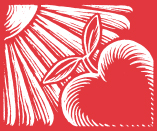 Daphne Rose Kingma, who taught me the profound effects of saying thanks, and to Donald E.
Daphne Rose Kingma, who taught me the profound effects of saying thanks, and to Donald E.
Contents

Introduction
In relation to others, gratitude is good manners; in relation to ourselves, it is a habit of the heart and a spiritual discipline. DAPHNE ROSE KINGMA A couple of days before I was to write the introduction to this book, I was making dinner.Contents

Introduction
In relation to others, gratitude is good manners;in relation to ourselves, it is a habitof the heart and a spiritual discipline. DAPHNE ROSE KINGMA A couple of days before I was to write the introduction to this book, I was making dinner.
Unexpectedly, the water main up the street broke and all water was cut off for several hours. Anyone who has tried to cook with no water knows how frustrating that experience can be. As I struggled along I suddenly realized what a lesson I was being given. Here I was, for the previous six months reading every known book (or at least it felt that way) that in any way related to giving thanks, and I had taken completely for granted the miracle of water coming out of my tap whenever I wanted it! If I could overlook that, what other blessings in my life had I not perceived? Gratefulnessgreat fullness, as Brother David Steindl-Rast reminds us, is the full response of the human heart to the gratuitousness of all that is. Truly every single thing we have has been given to us, not necessarily because we deserved it, but gratuitously, for no known reason. And whatever source we believe is the giversome concept of God or simply the breathtaking randomness of the universewhen we give thanks, we take our place in the great wheel of life, recognizing our connection to one another and to all of creation.
Offering a blessing, reminds Brother Steindl-Rast, plugs us into the aliveness of the whole world. Howard Thurman once wrote, To be alive is to participate responsibly in the experience of life, and for those of us who are uncomfortable within the structure of organized religion, finding a proper form for that responsibility has not been easy. We've tended to shy away from many of the rituals religion offers and too often have ended feeling disconnected and isolated. It is in the spirit of reconnection that this volume has been created. That there is a deep hunger for connectionwith ourselves, with one another, with nature, with the process of birth and death itselfis no surprise. What the writers here are offering, from a wide variety of spiritual disciplines and secular perspectives, is the awareness that setting aside time before we eat to acknowledge the blessings in our lives can go a long way to satisfy that hunger.
As I have spoken to people about this book, it is those with young children who've been the most excited. So much of our time is consumed by the details of living; I want to find a way for my family to share the experience of being a part of something greater than just ourselves, said one mother. With that in mind, the book comprises 365 blessings, both traditional and nontraditional, organized into four sections corresponding to the seasons, and designed to be used in a variety of ways. You may just open it and begin, reading one a day in the order given, using the ribbon to mark your place. Or you may pick and choose, using the index to find the topics you are interested in. Or you can open each evening at random and read what is offered.
I have tried to find selections on every possible human experience and could easily have filled volumes more. But I looked particularly for those that would speak to us all, regardless of spiritual orientation. Apropos of that, I have taken certain liberties with language, particularly patriarchal language (God almost always is male, particularly in those Christian prayers predating the late twentieth century). Bobby McFerrin's beautiful rendition of the Twenty-third Psalm on Medicine Man in which he changes all male pronouns to female is my inspiration for this. I encourage you to try using A Grateful Heart every day as a ritual and see what happens as a consequence. When was the last time, if ever, you saw anyone at Mc- Donald's offer an expression of thanks (a prayer, a song, a dance) for his or her food? asks Stephen Hyde in an article in The Sun entitled Great Man Going.
Billions of burgers consumed yet not a solitary act of gratitude, individual or corporate, no festival to honor the bovine being in myth and art and imagination, or to celebrate the annual resurrection of the potato. How can this be? What kind of monstrous indifference to the taking of life does this suggest? What kind of heinous disrespect for the life that sustains human life? What is the real price we pay for the convenience of fast and plentiful food? Apathy, neglect, isolation? Or it is something deeper, the loss of relationship, of wholeness, of soul?... Once, the rituals of gratitude informed nearly every aspect of human life. Most of these we have abandoned or forgotten. Now, try to imagine this: for every one of those burgers sold, a song raised, a life recalled, a measure of grace restored. J. J.
RYAN Berkeley, California
FALL
 Gratitude is heaven itself.
Gratitude is heaven itself. WILLIAM BLAKE T hou that hast given so much to me, Give one thing more, a grateful heart. Not thankful when it pleaseth me, As if thy blessings had spare days; But such a heart, whose pulse may be thy praise. GEORGE HERBERT N ow may every living thing, young or old, weak or strong, living near or far, known or unknown, living or departed or yet unborn, may every living thing be full of bliss. THE BUDDHA H ow easily we can forget how precious life is! So long as we can remember, we've just been here, being alive. Unlike other things for which we have a comparison black to white, day to night, good to badwe are so immersed in life that we can see it only in the context of itself. We don't see life as compared to anything, to not-being, for example, to never having been born.
Life just is. But life itself is a gift. It's a compliment just being born: to feel, breathe, think, play, dance, sing, work, make love, for this particular lifetime. Today, let's give thanks for life. For life itself! For simply being born! DAPHNE ROSE KINGMA 
Next page
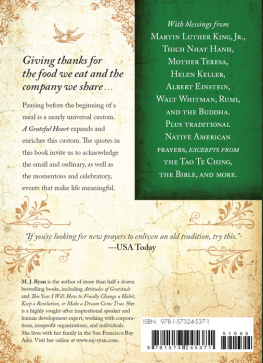
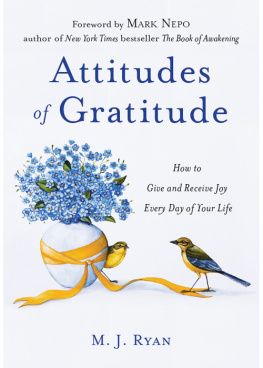
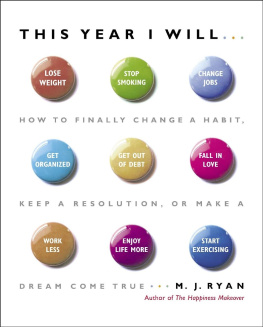
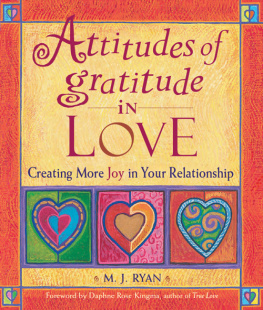
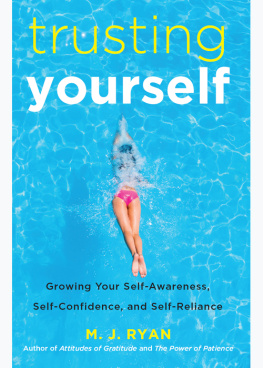
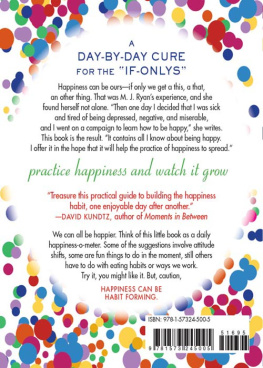

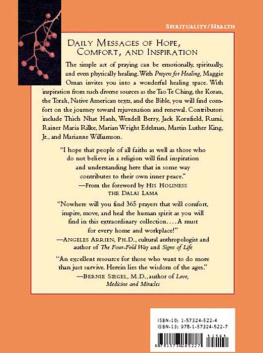
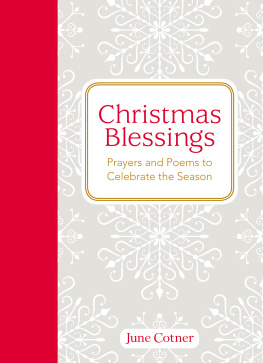
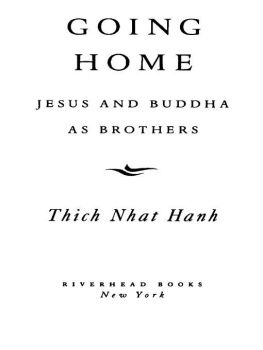
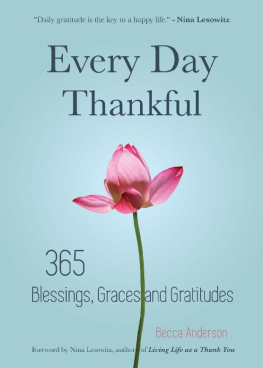
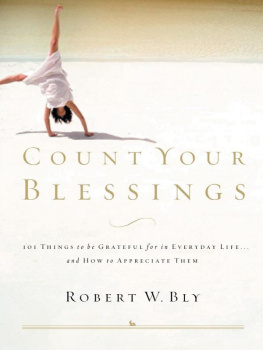
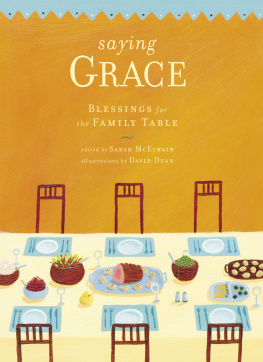
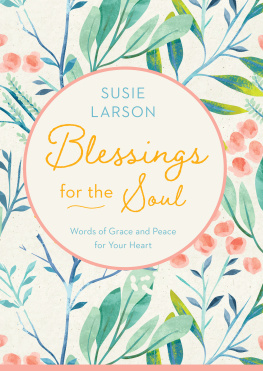
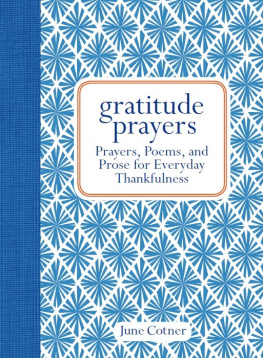

 Copyright 1994 by M. J. Ryan All Rights Reserved. No part of this book may be used or reproduced in any manner whatsoever without written permission, except in the case of brief quotations in critical articles or reviews. For information, contact Conari Press, an imprint of Red Wheel/Weiser, LLC with offices at 500 Third Street, Suite 230 San Francisco, CA 94107 Acknowledgments of permission to reprint previously published material are on pages 263265, which constitute an extension of this copyright page. J. Ryan. p. cm. 1. 1.
Copyright 1994 by M. J. Ryan All Rights Reserved. No part of this book may be used or reproduced in any manner whatsoever without written permission, except in the case of brief quotations in critical articles or reviews. For information, contact Conari Press, an imprint of Red Wheel/Weiser, LLC with offices at 500 Third Street, Suite 230 San Francisco, CA 94107 Acknowledgments of permission to reprint previously published material are on pages 263265, which constitute an extension of this copyright page. J. Ryan. p. cm. 1. 1. Daphne Rose Kingma, who taught me the profound effects of saying thanks, and to Donald E.
Daphne Rose Kingma, who taught me the profound effects of saying thanks, and to Donald E. Gratitude is heaven itself. WILLIAM BLAKE T hou that hast given so much to me, Give one thing more, a grateful heart. Not thankful when it pleaseth me, As if thy blessings had spare days; But such a heart, whose pulse may be thy praise. GEORGE HERBERT N ow may every living thing, young or old, weak or strong, living near or far, known or unknown, living or departed or yet unborn, may every living thing be full of bliss. THE BUDDHA H ow easily we can forget how precious life is! So long as we can remember, we've just been here, being alive. Unlike other things for which we have a comparison black to white, day to night, good to badwe are so immersed in life that we can see it only in the context of itself. We don't see life as compared to anything, to not-being, for example, to never having been born.
Gratitude is heaven itself. WILLIAM BLAKE T hou that hast given so much to me, Give one thing more, a grateful heart. Not thankful when it pleaseth me, As if thy blessings had spare days; But such a heart, whose pulse may be thy praise. GEORGE HERBERT N ow may every living thing, young or old, weak or strong, living near or far, known or unknown, living or departed or yet unborn, may every living thing be full of bliss. THE BUDDHA H ow easily we can forget how precious life is! So long as we can remember, we've just been here, being alive. Unlike other things for which we have a comparison black to white, day to night, good to badwe are so immersed in life that we can see it only in the context of itself. We don't see life as compared to anything, to not-being, for example, to never having been born.